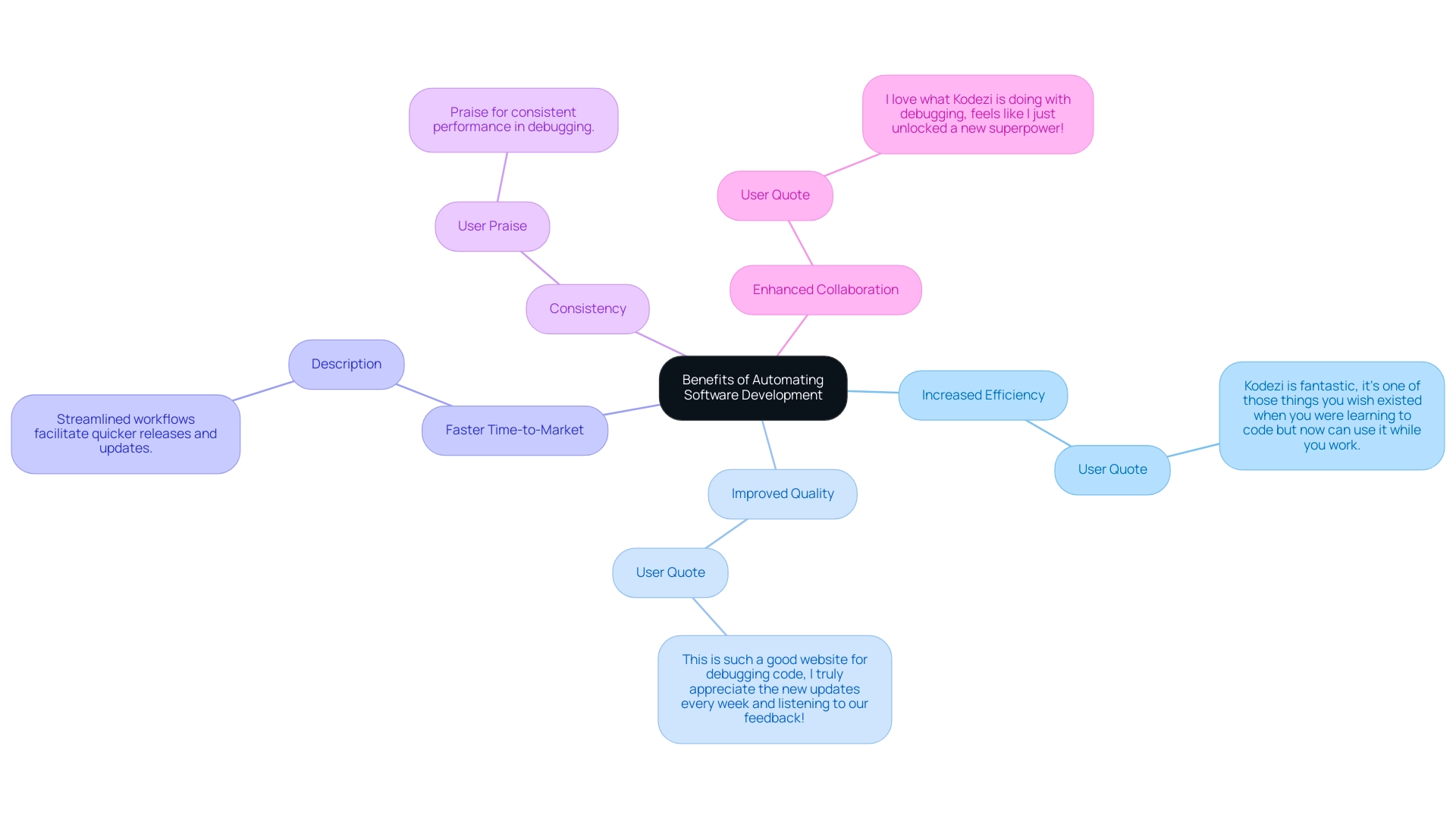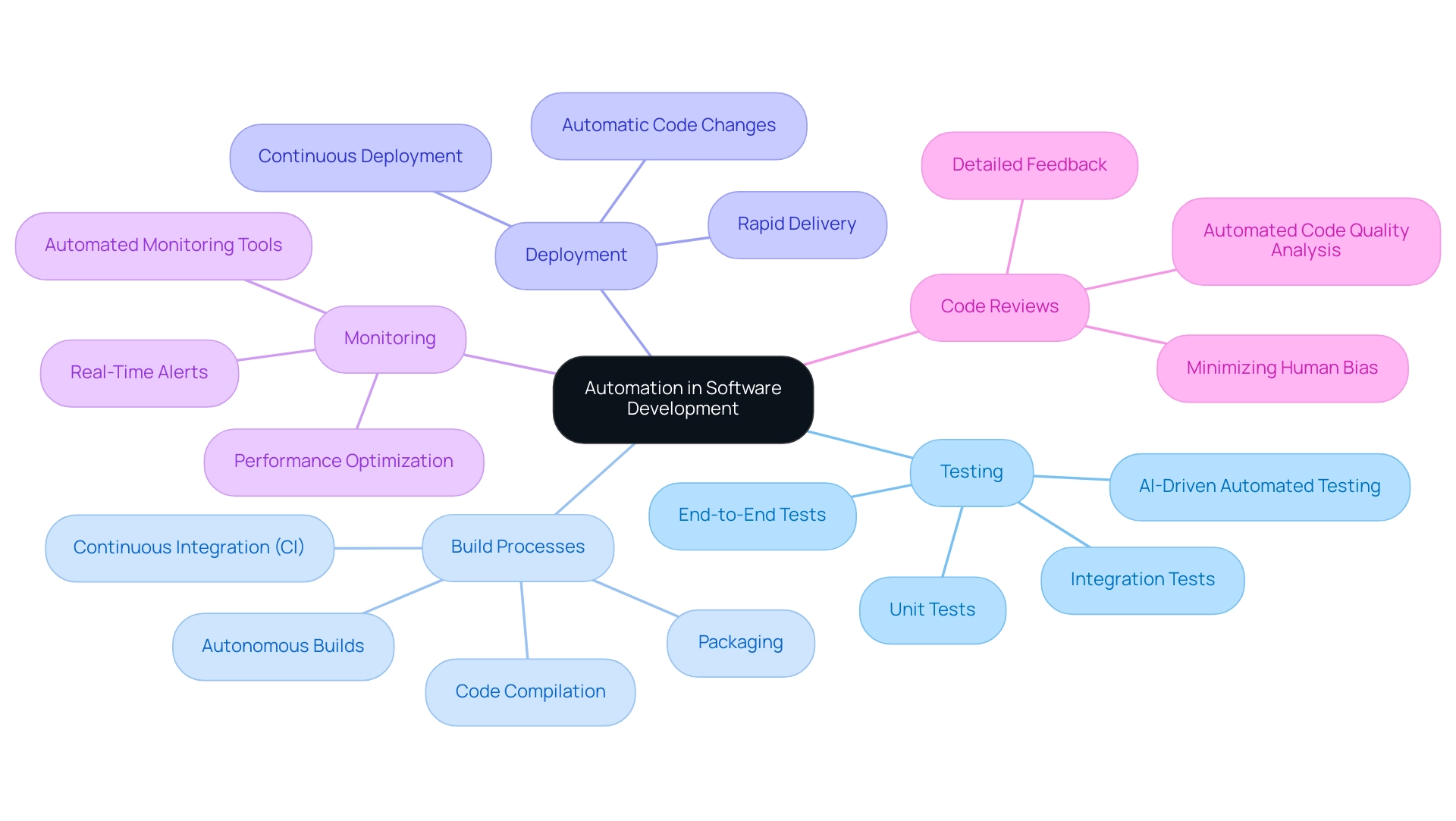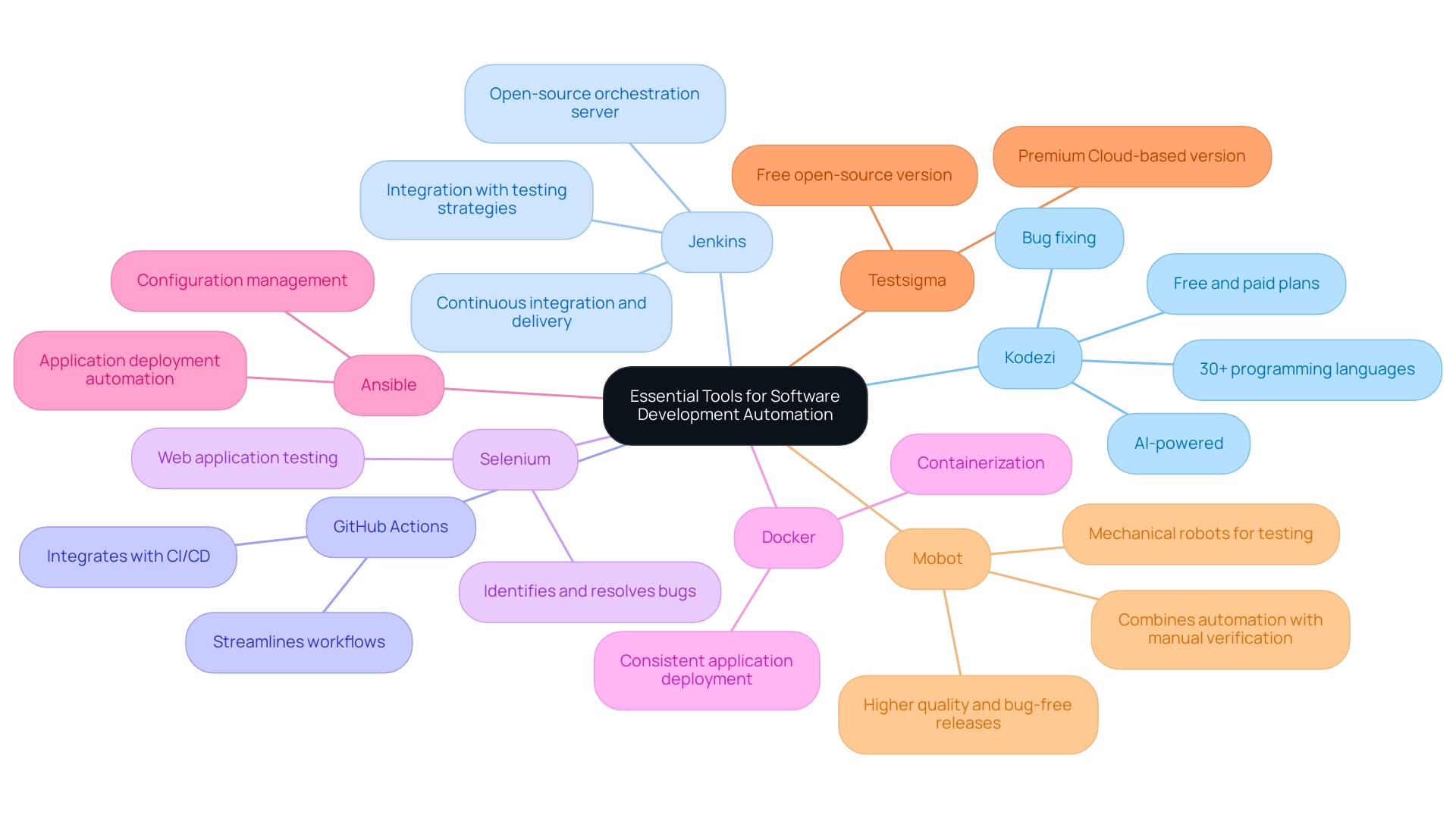Introduction
In the dynamic landscape of software development, automation is not just a trend—it's a catalyst for transformation. As teams strive to enhance productivity and streamline processes, tools like Kodezi CLI emerge as game-changers, enabling developers to focus on innovation rather than repetitive tasks.
From accelerating code debugging to automating deployment and testing, the advantages of integrating automation into development workflows are substantial. With a growing acceptance of these technologies, organizations are witnessing remarkable improvements in efficiency, quality, and collaboration.
As the industry evolves, understanding the essential areas to automate and the tools available will empower teams to harness the full potential of this digital revolution, ultimately leading to greater success and agility in an ever-changing environment.
Understanding Software Development Automation
The use of technology in software development mechanization helps to automate software development by executing tasks that typically require human input, significantly enhancing efficiency across development teams. The CLI stands out as a versatile tool for teams, enabling them to auto-heal codebases with the CLI in seconds, never waste time on a pull request ever again. This system is designed to automate software development by incorporating repetitive processes such as:
- Code compilation
- Testing
- Deployment
- Monitoring
This enables teams to achieve substantial productivity gains, reduce human error, and focus on more intricate challenges.
As organizations increasingly adopt tools like Kodezi, they illustrate a broader trend in the software industry to automate software development. Recent data shows that 60% of workers react favorably to mechanization in the workplace, highlighting its increasing acceptance and significance. Key methodologies like continuous integration and continuous deployment (CI/CD) are central to maximizing the advantages of processes that automate software development.
Understanding these components is vital for harnessing the full potential of automation in your projects, which can help automate software development and ultimately drive innovation and growth in a rapidly evolving landscape. The CLI functions as a Swiss-Army Knife for programmers, enhancing programming productivity through automated code generation from PDF instructions using AI and intuitive drag-and-drop functionality. The case study titled 'Impact of Automation on Jobs' illustrates this shift, showing how the trend of digital transformation through artificial intelligence and robotics is set to automate software development and many tasks across industries, which is expected to dramatically change job functions.
As organizations embrace these practices, the environment of application creation is poised to be changed to automate software development, significantly enhancing productivity and efficiency. Try the CLI today to experience these benefits firsthand and elevate your programming productivity!
Benefits of Automating Software Development
The advantages of automating software creation significantly enhance productivity and quality, showcasing the importance of how we automate software development. Key benefits include:
- Increased Efficiency: By automating repetitive tasks, developers can redirect their efforts toward more critical and innovative work, ultimately driving project success. Users have reported that Kodezi has drastically improved their debugging efficiency, with one user stating, "Kodezi is fantastic, it's one of those things you wish existed when you were learning to code but now can use it while you work."
- Improved Quality: Automated testing plays a pivotal role in identifying bugs early in the development cycle. This proactive approach not only enhances the overall quality of the software but also minimizes costly fixes later in the process. As Pradeep from the Indian Institute of Technology Delhi mentioned, "This is such a good website for debugging code, I truly appreciate the new updates every week and listening to our feedback!"
- Faster Time-to-Market: By utilizing automation to automate software development, streamlined workflows facilitate quicker releases and updates, which are crucial for maintaining a competitive edge in a rapidly evolving market. The CLI autonomously enhances codebases and resolves errors before they reach production, ensuring that engineering teams can deliver updates quickly and dependably.
- Consistency: To automate software development, automation standardizes processes, ensuring that tasks are executed uniformly every time. This reduces variability and the potential for human error, leading to more reliable outcomes. Users have praised the platform for its consistent performance in debugging, which helps maintain high quality across projects.
- Enhanced Collaboration: With routine tasks handled by technology, team members can focus on complex issues, fostering improved collaboration and problem-solving capabilities within development teams. As noted by Ansgar, an engineer, "I love what Kodezi is doing with debugging, feels like I just unlocked a new superpower!"
The increasing significance of mechanization, especially as companies look to automate software development, is evident in market trends; for example, the Industrial Mechanization Services Market is anticipated to grow from $147.06 billion in 2019 to $264.69 billion by 2026. Moreover, a recent McKinsey survey indicated that 66% of businesses have taken steps to automate software development processes across various functions, up from 57% in 2018, emphasizing a significant shift toward operational efficiency in the development industry. Significantly, 80% of health systems intend to invest in digital healthcare solutions over the next five years, as indicated by HIMSS, emphasizing the crucial role of mechanization in improving program quality and operational efficiency.
Furthermore, the case study titled 'Impact of Automation on Employment' indicates that factors such as remote work and e-commerce may compel over 100 million employees to change careers by 2030 due to technological progress, illustrating the broader implications of this shift.

Key Areas to Automate in Software Development
When considering automation in software creation, there are several key areas to focus on that can significantly enhance efficiency and productivity:
- Testing: It is essential to automate software development by automating unit tests, integration tests, and end-to-end tests to maintain high code quality and functionality. In 2024, statistics indicate that the need to automate software development will make automated testing account for a significant portion of testing practices, reflecting its growing importance in the industry. The CLI, with its AI-driven automated testing, ensures that your code adheres to the latest standards and practices, further enhancing overall quality.
- Build Processes: Continuous Integration (CI) tools can help automate software development by automating code compilation and packaging, minimizing manual errors and speeding up the cycle. The autonomous builds from this platform help to automate software development, streamline this process, improve overall code reliability, and allow engineering teams to focus on innovation.
- Deployment: Implementing Continuous Deployment practices allows us to automate software development and ensure automatic deployment of code changes to production. This ensures that new features and fixes reach users faster, aligning with the current emphasis on rapid delivery in software development. The platform's automated deployment features are designed to automate software development, enhancing this process by providing seamless integration into existing workflows.
- Monitoring: Automated monitoring tools are invaluable for tracking application performance. They provide real-time alerts to teams about potential issues, enabling swift actions and maintaining application integrity. The CLI enhances this by providing insights into codebase issues, allowing for rapid troubleshooting and performance optimization.
Using tools to automate software development can enhance the code review process by analyzing code quality and ensuring adherence to standards. The CLI empowers engineering teams to automate software development by automating code reviews and providing detailed feedback, which accelerates the review process and minimizes human bias. This reflects advancements observed in HR processes, which has improved recruitment practices for 25% of companies by reducing bias. Kodezi CLI excels in identifying and fixing codebase issues in seconds, including performance bottlenecks and security vulnerabilities, to automate software development and enhance code formatting. It offers comprehensive clarifications and perspectives on what occurred and how it was addressed, guaranteeing that your codebase adheres to the most recent security best practices and coding standards.
As business leaders progressively acknowledge the influence of mechanization—illustrated by 61% believing it assists in choosing the right talent—adopting these mechanization strategies is vital for contemporary development teams. Furthermore, while AI is unlikely to replace engineers, it serves to enhance growth and ensure accuracy and precision in projects. This transformation mirrors the profound changes seen in manufacturing during the 20th century, where modern automation streamlined processes beyond previous expectations.
Improved growth, accuracy, and precision in programming projects are achievable by using CLI to automate software development through extensive automated processes. To get started, check out our 5-minute quickstart guide and see a demonstration of the CLI in action.

Essential Tools for Software Development Automation
To achieve maximum efficiency in software development, it is crucial to automate software development by leveraging the right automation tools. Here are some of the most effective tools that stand out in 2024:
- This tool: An AI-powered programming tool that acts as an autocorrect for code, it automatically analyzes and fixes bugs while optimizing your code. It can explain the details of bugs, generate comments, and supports over 30 programming languages, significantly enhancing productivity for programmers across all industries. Kodezi offers both free and paid plans, making it accessible for various users, whether they are just starting or are seasoned professionals. Its distinctive method sets it apart from tools such as Copilot, which mainly concentrate on autocompletion instead of bug fixing.
- Jenkins: Celebrated as a top open-source orchestration server, Jenkins enables smooth building, testing, and deploying of applications, establishing it as a fundamental component of continuous integration and delivery. Its ability to integrate with various testing strategies helps teams efficiently address common application bugs.
- GitHub Actions: This tool enables the streamlining of workflows directly from your GitHub repository, integrating effortlessly with CI/CD processes to enhance project cycles.
- Selenium: A powerful solution for managing web applications, Selenium is essential for efficient testing, helping teams quickly identify and resolve application bugs.
- Docker: By employing containerization, Docker simplifies application deployment, ensuring that programs run consistently across various environments, which is vital for maintaining quality.
- Ansible: This tool automates configuration management and application deployment, allowing teams to manage infrastructure with ease and reduce the risk of manual errors.
In 2024, tools like Selenium, JUnit, and Katalon Studio are also recognized for their effectiveness in enhancing testing strategies. Notably, Testsigma offers both a free, open-source version and a premium 'Cloud-based' version, providing flexibility for different user needs. Companies like Mobot illustrate the success of mechanization; by employing mechanical robots for mobile app testing, they guarantee higher quality and bug-free releases, merging the efficiency of mechanization with the thoroughness of manual verification.
As XENON HOLDINGS noted, 'Their comprehensive test cases and efficient system updates impressed us the most,' highlighting the importance of robust testing strategies. Adopting these crucial instruments can greatly enhance the application creation process to automate software development, leading to improved performance and dependability.

The Future of Automation in Software Development
The future of mechanization in software creation is poised to experience transformative advancements, propelled by several key trends:
- AI and Machine Learning: The incorporation of AI is revolutionizing testing processes by enhancing predictive analytics, enabling teams to make more informed decisions and improve software quality. Tools like the CLI exemplify this trend, enabling automated code generation from PDF instructions through an intuitive drag-and-drop interface, thereby streamlining coding tasks and boosting productivity.
- Low-Code/No-Code Platforms: These platforms empower non-technical users to simplify workflows easily, broadening participation in initiatives and reducing reliance on specialized coding skills.
- Integration with DevOps: The ongoing merging of creation and operations practices helps to automate software development, streamline processes, foster collaboration, and improve overall workflow efficiency across teams. Kodezi CLI plays a crucial role here, acting as a versatile tool for teams to auto-heal codebases and significantly reduce the time wasted on pull requests.
- Enhanced Security Automation: Organizations are increasingly automating security checks and compliance processes to proactively address vulnerabilities, thus minimizing risks associated with breaches. Significantly, robust cloud infrastructure can result in a 57% reduction in downtime and a 26% decline in breach-related expenses, highlighting the vital significance of security processes in contemporary development practices.
- Continuous Improvement: A dedication to ongoing enhancement is crucial, as organizations frequently update and refine their operational practices to adjust to progressing technologies and retain a competitive advantage.
As noted in the retail and e-commerce industries, where 38.5% of software development initiatives are focused, mechanization is not simply a trend but a necessary evolution. With 91% of organizations forming central teams for IT process improvement in 2024—up from 77% in 2023—the significance of strategic practices is undeniable. Kodezi CLI, as a Swiss-Army Knife for programmers, is positioned to significantly enhance productivity by minimizing repetitive tasks and maximizing efficiency.
As highlighted in the case study 'The Rise of Workflow Automation,' enterprises are increasingly viewing workflow platforms not just as tools for eliminating repetitive tasks, but as essential components that help automate software development and drive digital transformation. As Akhila Mathai aptly puts it, effective collaboration and communication are vital in creating relevant and up-to-date information in the realm of emerging technologies, making it essential to automate software development as a cornerstone for future success.
Conclusion
Embracing automation in software development is no longer just an option; it is a strategic necessity for teams aiming to thrive in a competitive landscape. The integration of tools like Kodezi CLI not only streamlines repetitive tasks but also empowers developers to focus on innovation and creativity, leading to remarkable gains in productivity and quality.
The benefits of automation are clear:
- Increased efficiency
- Improved software quality
- Faster time-to-market
- Enhanced collaboration among team members
By automating key areas such as testing, deployment, and monitoring, teams can reduce human error and maintain consistency in their workflows. As organizations recognize these advantages, the shift towards automation continues to gain momentum, with many already reaping the rewards of enhanced operational effectiveness.
Looking ahead, the future of automation in software development will be shaped by advancements in AI, the rise of low-code platforms, and the integration of security measures. As the landscape evolves, it is imperative for teams to stay informed and adapt their strategies accordingly, ensuring they harness the full potential of automation. Kodezi CLI stands at the forefront of this transformation, offering powerful tools that elevate programming productivity and drive success. By prioritizing automation, organizations can effectively navigate the complexities of software development and achieve lasting results in an ever-changing environment.
Unlock your team's potential with Kodezi CLI—start automating your development processes today!
Frequently Asked Questions
How does technology enhance software development mechanization?
Technology automates software development by executing tasks that typically require human input, significantly improving efficiency across development teams.
What tasks can be automated in software development?
Key repetitive processes that can be automated include code compilation, testing, deployment, and monitoring.
What are the benefits of automating software development?
The benefits include increased efficiency, improved quality through early bug detection, faster time-to-market, consistency in task execution, and enhanced collaboration among team members.
How does the CLI contribute to software development automation?
The CLI acts as a versatile tool for teams, allowing them to auto-heal codebases quickly and automate various processes, thereby enhancing programming productivity through automated code generation and intuitive functionalities.
What is the significance of continuous integration and continuous deployment (CI/CD) in automation?
CI/CD methodologies are essential for maximizing the benefits of automating software development processes, enabling teams to streamline workflows and improve project outcomes.
What is the current trend regarding mechanization in the workplace?
Recent data shows that 60% of workers react positively to mechanization in the workplace, indicating a growing acceptance of automation in various industries.
How does automation impact the quality of software?
Automation, particularly through automated testing, helps identify bugs early in the development cycle, enhancing software quality and reducing the need for costly fixes later.
What market trends reflect the growth of automation in software development?
The Industrial Mechanization Services Market is expected to grow significantly, and a McKinsey survey indicates that 66% of businesses have taken steps to automate software development processes, highlighting a shift toward operational efficiency.
How does automation affect employment in the software industry?
Automation may compel over 100 million employees to change careers by 2030 due to technological advancements, illustrating the broader implications of this shift in job functions.




